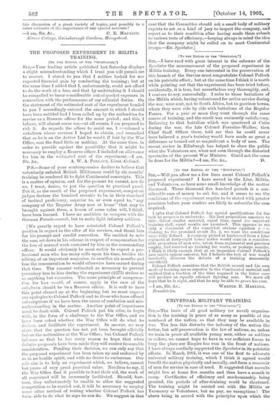rin THE EDITOR OF THE "SPECTATOR."]
Sin,—Your leading article published last Saturday displays a slight misunderstanding which I trust you will permit me to correct. I stated to you that I neither looked for nor expected financial gain by conducting the training ; but at the same time I added that I, unfortunately, could not afford to do the work at a loss, and that by undertaking it I should be compelled to incur considerable out-of-pocket expenses in connection with the performance of my editorial duties. On the statement of the estimated cost of the experiment handed to you I accordingly entered the amount to which I should have been entitled had I been called up by the authorities for service as a Reserve officer for the same period ; and this, I believe, will almost cover me,—at all events, I am prepared to risk it. As regards the officer to assist me, I mentioned a subaltern whose services I hoped to obtain, and remarked that as he is on the Active List he would, if lent by the War Office, cost the fund little or nothing. At the same time, in order to provide against the possibility that it might be necessary to employ a Reserve officer, I included an allowance for him in the estimated cost of the experiment.—I am, Sir, &c., A. W. A. POLLOCK, Lieut.-Colonel.
P.5.—Some of your contemporaries decline to believe that voluntarily enlisted British Militiamen could by six months' training be rendered fit to fight Continental conscripts. This is a matter of opinion, and for the present we cannot, nor do we, I trust, desire, to put the question to practical proof. But if, as the result of the proposed experiment, competent judges declare the hundred recruits to be, in their standard of tactical proficiency, superior to, or even equal to, "any company of the Regular Army now at home" that may be brought against them, a lesson of some value will, I think, have been learned. I have no ambition to compete with the German Parade-marsch, but to make light infantry soldiers.
[We greatly regret to have misstated Colonel Pollock's position in regard to the offer of his services, and thank him for his prompt and candid correction. We omitted to note the sum set down in his scheme in respect of compensation for the loss of normal work sustained by bins as the commanding officer: It would obviously be most unfair to expect a pro- fessional man who has many calls upon his time, besides the editing of an important magazine, to sacrifice six months and lose the remuneration be would otherwise have earned during that time. The amount estimated as necessary to prevent pecuniary loss to him during the experiment (L275) strikes us as anything but excessive. The same principle of compensa- tion for loss would, of course, apply in the case of the subaltern should lie be a Reserve officer. It is well to have this point cleared up at the beginning, but we must express our apologies to Colonel Pollock and to those who have offered subscriptions if we have been the cause of confusion and mis- understanding in the matter. Another point of importance must be dealt with. Colonel Pollock put his offer, to begin with, in the form of a challenge to the War Office, and we have been asked whether the War Office will do what he desires, and facilitate the experiment. In answer, we may state that the question has not yet been brought officially before the authorities at the War Office ; but Colonel Pollock informs us that lie has every reason to hope that when definite proposals have been made they will receive favourable consideration. Pending their decision, we can only say that the proposed experiment has been taken up and endorsed by us in no hostile spirit, and with no desire to embarrass. Our sole aim is to help an experiment which, we believe, cannot but prove of very great practical value. Needless to say, if the War Office find it possible to lend their aid, the work of all concerned will be immensely facilitated. Should, how- ever, they unfortunately be unable to allow the suggested competition to be carried out, it will be necessary to employ some other method of testing whether Colonel Pollock has been able to do what he says he can do. We suggest in that
case that the Committee should ask a small body of military experts to act as a kind of jury to inspect the company, and report as to their condition after having made them submit to various tests of efficiency,—keeping always in mind the idea that the company might be called on to meet Continental troops.—En. Spectator.]














































 Previous page
Previous page